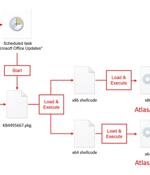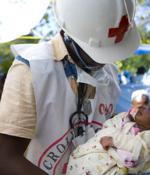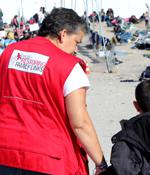Security News

The International Committee of the Red Cross, the humanitarian protection organization responsible for promoting international law, has set out eight rules for hacktivists and another four for states to discourage civilian involvement in cyberattacks against other countries. The rate at which civilians are becoming involved in international conflicts has been described as "a worrying trend" by the ICRC - a phenomenon exacerbated by the ongoing war in Ukraine, which has seen for the first time conflict taking place in both the physical and digital space concurrently.

A new threat actor known as AtlasCross has been observed leveraging Red Cross-themed phishing lures to deliver two previously undocumented backdoors named DangerAds and AtlasAgent. NSFOCUS...

A new APT hacking group named 'AtlasCross' targets organizations with phishing lures impersonating the American Red Cross to deliver backdoor malware. Cybersecurity firm NSFocus identified two previously undocumented trojans, DangerAds and AtlasAgent, associated with attacks by the new APT group.

The International Committee of the Red Cross wants some digital equivalent to the iconic red cross, to alert would-be hackers that they are accessing a medical network. The emblem wouldn't provide technical cybersecurity protection to hospitals, Red Cross infrastructure or other medical providers, but it would signal to hackers that a cyberattack on those protected networks during an armed conflict would violate international humanitarian law, experts say, Tilman Rodenhäuser, a legal adviser to the International Committee of the Red Cross, said at a panel discussion hosted by the organization on Thursday.

The International Committee of the Red Cross wants to devise a digital equivalent of its emblems, to signify that certain digital resources are protected and must not be targeted during cyberwarfare. "For more than 150 years, protective emblems like the red cross have been used to convey a simple message: In times of armed conflict, those who wear the red cross or facilities and objects marked with [it] must be protected from harm," the organization wrote last week, adding "The obligation of all warring parties to respect and protect medical and humanitarian actors applies online as well."

The International Committee of the Red Cross said today that the hack disclosed last month against its servers was a targeted attack likely coordinated by a state-backed hacking group. To breach the Red Cross servers, the threat actors used tactics and custom hacking tools "Designed for offensive security" and obfuscation techniques to evade detection, usually linked to advanced persistent threat groups.

The Red Cross is imploring threat actors to show mercy by abstaining from leaking data belonging to 515,000+ "Highly vulnerable" people that were stolen from a program used to reunite family members split apart by war, disaster or migration. The attack forced the ICRC, along with the wider Red Cross and Red Crescent network, to shut down the systems underpinning the Restoring Family Links site.

Humanitarian organization the International Red Cross disclosed this week that it has fallen foul of a cyberattack that saw the data of over 515,000 "Highly vulnerable people" exposed to an unknown entity. The target of the attack was the organisation's Restoring Family Links operation, which strives to find missing persons and reunite those separated from their families due to armed conflict, migration, disaster, detention and other catastrophic events.

A cyberattack on a Red Cross contactor has led to the theft of personal data for more than 515,000 people in 'Restoring Family Links,' a program that helps reunite families separated by war, disaster, and migration. The announcement comes from the International Committee of the Red Cross, which states that the data was compiled by at least 60 different Red Cross and Red Crescent National Societies worldwide.

Following the surge of cyber attacks on medical facilities, the head of the International Committee of the Red Cross and more than 40 other international leaders asked the governments of the world to do more to safeguard critical medical organizations amid the coronavirus pandemic. In an open letter published on Tuesday, Peter Maurer, president of the ICRC, and other prominent signatories asked the world's government's "To take immediate and decisive action to stop all cyber attacks on hospitals, health care and medical research facilities, as well as on medical personnel and international public health organizations."